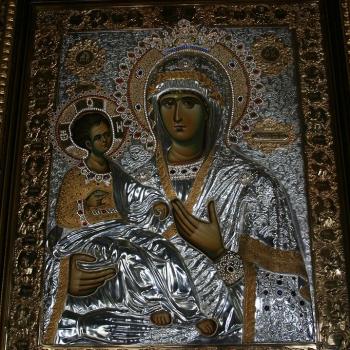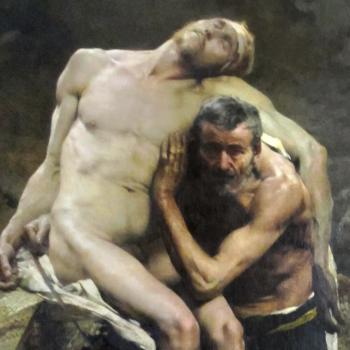
Dear Mr. Limbaugh: No one is trying to make you the “villain” in a “soap opera” about the pope, as you claim. Okay, yes, there is a nutty left-wing group, promoted by Media Matters, who is out there gathering signatures for some dumb petition. But all that is street theater. They hardly speak for the many serious and orthodox Catholics who for good reasons object to your claim that the pope is a Marxist. I have not heard you mention them. Now don’t you think that’s odd?
You might, for example, have read my own rebuttal; I sent it to you. Or you might have given a passing glance at Mark Shea, in the National Catholic Register. Or you could have read Trent Horn at Catholic Answers. And Fr. John Trigilio, a host on EWTN, also replied to your facile words about the pope. Not I, nor Mr. Shea, nor Mr. Horn, nor yet Fr. Trigilio, are part of some “left-wing, pro-abortion bunch.” We are faithful Catholics who know how poorly you have understood the pope, and we have said so. But so far as I can tell, you remain unaware of this analysis that exists out there in the Catholic blogosphere—not on kook sites like Media Matters, but on well-respected, orthodox sites like the National Catholic Register, Patheos, and Catholic Answers. (And my blog.)
You have said and said and said again that the pope railed against “unfettered capitalism.” But the simple fact, Mr. Limbaugh, is that those words are nowhere to be found in the actual text. The pope used that phrase a grand total of zero times. A writer for Foreign Policy, Christian Caryl, wrote an article in which he likewise misquoted the pope. I sent him a tweet that Francis never said anything of the kind; he corrected the article. I sent you an email stating the same thing. Where’s yours? Who is really engaging in a “relentless pursuit of the truth” here?
So I will issue you the same challenge one more time: If Pope Francis attacked “unfettered capitalism,” then show me where he does that. Give me a citation from the actual text. It should not be hard for you to check out, Mr. Limbaugh. You go to the Vatican’s Web site; you run a keyword search. Now, perhaps the keyword search function on my Internet browser is broken; that kind of thing happens. But here is what I found: Not only is the phrase “unfettered capitalism” nowhere in the text, but the words “capitalism” and “unfettered” are not there either. If I am incorrect—if I misspelled a word, or if my iPad is buggy—then prove me wrong. Do your homework; verify your sources; don’t just rely on the Washington Post to get it right. Does your daily, relentless, unstoppable pursuit of the truth actually stop when it comes to going to the Vatican’s Web site? Or has the pope just blocked your IP address? You have no problem blasting him by name, but have you read him? Have you looked at the text?
Now, I know that the media has run wild with the expression “unfettered capitalism,” to such an extent that one might believe that the pope really does “badger” capitalism, as you claim. But that would be false. Just because the drive-bys say it does not make it so, Mr. Limbaugh. The pope does attack consumerism, but that is not at all the same.
The reason the pope is concerned with consumerism is not because he has a bias against free markets. Instead he has a love for the intrinsic worth of the human person; so much so, that he does not like to see it blunted by greed—by the constant pursuit of stuff. When things become more important than people, and when having becomes more important than being, we can not fulfill our true longing, which is for God. The pope attacks a spiritual sickness, not an economic system.
If you do a keyword search of the text, you will find that the word “consumerism” does show up—four times. And that is four more times than the word “capitalism” does. It is four more than “unfettered.” The fourth time it shows up, the pope is talking about spiritual consumerism rather than economic consumerism, so we can leave that one go and focus on the other three.
Here is the first:
The great danger in today’s world, pervaded as it is by consumerism, is the desolation and anguish of a complacent yet covetous heart, the feverish pursuit of frivolous pleasures, and a blunted conscience. (§2)
Now, this is hardly an attack on the free market, but rather the constant pursuit of stuff. The gist of what the pope is saying here is not that free markets are bad, but that greed does not satisfy the human heart and blunts the conscience.
Here is the second:
Today’s economic mechanisms promote inordinate consumption, yet it is evident that unbridled consumerism combined with inequality proves doubly damaging to the social fabric. (§60)
And indeed, who would deny that advertisers are always appealing to greed (and also sex) in order to sell products? The ethos of the ad is not “buy this and have a good life” but “buy this and satisfy your lusts.”
And here is the third:
The causes of [social] breakdown include … unbridled consumerism which feeds the market.
If consumerism “feeds the market,” that does not mean the market itself is bad. But the pope does have some real concerns about the market’s diet.
It is not true to say—as you do—that Evangelii Gaudium is an “economic treatise.” The pope’s true subject is the Gospel and whatever stands in the way. Greed so misforms the mind that prosperity becomes a higher value than truth. The pope is not telling nations to choose one economic system over another; in fact, he goes out of his way to point that out. But he does caution us about the moral truths that should govern our economic behavior, in the same way that popes also discuss the moral truths that should govern our sexual behavior. If the pope says that birth control is wrong, he is not writing a treatise on sex; if the pope says that greed is wrong, he is not writing a treatise on economics.
Sex is a good thing, but not everything that people do sexually is good. And free markets are a good thing, but not everything that the free market does is good either. The pope meant no more than that, and no more than that should be read into his words. To rave on about how all prosperity comes from capitalism and how the United States is the greatest source of charity in the world is apropos of nothing, because the pope does not dispute any of that. In fact, he never even brings it up.
In truth, Mr. Limbaugh, I am more than a little surprised that you would blindly accept the media narrative about this pope. I am surprised because it is not your usual practice to do so. Has the thought not occurred to you that the media may be saying that the pope attacks capitalism only because that is the what they want us to believe? It suits their progressive agenda if they can say the pope is on their side. But since when has the mainstream media felt obligated to tell the truth, particularly about something related to the Church? Has the thought of going to the text, and seeing for yourself, not occurred to you?
There is a war of narratives going on about this pope. It is disappointing to watch because the pope’s categories of thought are not political but spiritual. He is less concerned with the kingdom of this world than he is with the kingdom of the next; and he is hardly going to waste his time writing a text as long as this one just so that he can attack free markets in the United States. You simply can not understand this pope, or any pope, through the standard dichotomy of right and left. People do try. But that is a sign of just how much we have created an idol of the news. That too stands in the way of the Gospel.
You say that you admire Catholicism and have often wanted to learn more about it. I have no reason to doubt you. Perhaps this is the time for you to do so. It may also be the time for you to try to admire it for something deeper than just your friendships with some priests and your admiration of the great wealth of the Vatican. The Church is supposed to direct us to truth, not to money.
That is why it is also disappointing to hear you say that the Catholic Church would be nowhere without capitalism and that it took a great deal of wealth to build the Vatican. But no. The Catholic Church got by quite well under feudalism, and money and rich people existed long before capitalism did. That does not mean capitalism is bad. But the reason the Catholic Church has survived for 2000 years is not because of capitalism but because of the Holy Spirit. The Vatican is beautiful not because wealth is beautiful but because truth is beautiful.
Thomas Storck at Ethika Politika has written a great piece that I think you should read. In it he says that Francis’s criticism of the behavior of markets is consistent with Catholic teaching and, in fact, very mild by historical standards. I also invite you to read the social doctrine of the Church as found in the documents Mr. Storck cites, as well as the Catechism of the Catholic Church. I invite you to read the words of the pope himself, who praises business and attacks Marxism. (Yes, the pope attacks Marxism, not capitalism. If you read my earlier blog article, you will see I have the quotations to back it up.) I invite you, finally, to make yourself more familiar with the writing of orthodox Catholics on the Web sites I mentioned earlier. You could do no better than to read the National Catholic Register, or the great bloggers at Patheos, or the great apologists at Catholic Answers. They certainly understand the Church, and the pope, much more deeply than your sources in the mainstream media do. Not only do they write about the faith every day, but they live it every day.
***
If you like the content on this blog, your generous gift to the author helps to keep it active. I remember all my supporters in my Mass intentions each week.
















